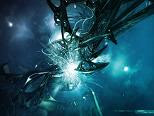Seltzer water (a.k.a. club soda). From the German village of Selters an der Lahn, 200 miles from Duchau, where Edward "Teddy" Daniels (Leonardo DiCaprio) saw death -- "too many bodies to count . . . too many to imagine." That's all that Teddy, the US Marshal, is willing to imbibe during his stay on Shutter Island, home to the Ashecliff Hospital for the criminally insane. With his partner, Chuck Aule (Mark Ruffalo), Teddy arrives to investigate the disappearance of Rachel Solando, a manic depressive patient incarcerated for the murder of her three children. Met with unease by the hospital staff and deception by the head psychiatrist, Dr. John Crawley (Ben Kingsley), Teddy suspects that Ashecliff is conducting human experiments, transforming its patients into "ghosts" by conducting lobotomies and other horrific surgical procedures. Teddy himself has his own ghost to confront -- that of his wife, Dolores (Michelle Williams), who died in a fire set by Andrew Laeddis (Elias Koteas), a demented pyromaniac whom Teddy believes to be the hospital's elusive "67th patient." As the visions of Dolores increase, so does Teddy's obsession with infiltrating the island's secluded lighthouse, which he believes to conceal Ashefield's greatest secret, a shocking revelation that may just turn out to be his own.
For viewers who've seen their share of crazy films (pun intended) Shutter Island fails to hold up to its promise to "keep you guessing." Director Martin Scorsese's golden egg with the perceptible golden yolk is like a cliché plot decked out in beautiful scenery. A nosey-newcomer with a crippled past disembarks in a remote territory and collides with a herd of eerie, menacing inhabitants. Rewind. September, 2006. Nicholas Cage is Detective Edward Malus who arrives on Summerisle in the middle of nowhere and encounters a Druidic order of women intent on human sacrifice (The Wickerman). Rewind. February, 2005. Joshua Leonard (The Blair Witch Project) is Clark Stevens, an intern at Cunningham Hall Mental Facility who goes insane while mingling with the deranged patients of a shady head pychiatrist (Madhouse). Rewind. March, 2004. Johnny Depp is Mort Rainey, an author with writer's block who concocts a murderous alternate personality as a result of marital issues (Secret Window). Common tale. Common end. "Oh my God, they killed Kenny! You bastards!"
Before Gangs of New York (2002), DiCaprio's first film in his working relationship with Martin Scorsese, the role of Jack Dawson in the 1997 blockbuster hit, Titanic, launched his career as the pretty boy of Hollywood. "Leo Mania" took audiences by storm with films like The Man in the Iron Mask (1999) and Catch Me If You Can (2002). DiCaprio's collaboration with Scorsese in the 2004 biography, The Aviator, earned him his second Academy Award nomination (the first was in 1993 for the role of Arnie Grape in What's Eating Gilbert Grape?, starring Johnny Depp). In Shutter Island, DiCaprio delivers a profound performance as Teddy Daniels, whose detachment from his own identity is a fascinating portrayal of Catch-22 psychosis. Ok, so if I deny I'm crazy that means I am, and if I know I'm crazy, that means I'm not all THAT crazy. So . . . where were we? We can at least say this for DiCaprio: the guy is genuine. When he's not being nearly crushed to death by a tree or climbing down a cliff, he's playing the role of the street-smart cop with a conspiracy to uncover. While the audience may know the difference between a toy gun and the real thing, Teddy clearly does not and the bonafide paranoia depicted by DiCaprio is the main catalyst and must-see aspect of the film.
Besides the outstanding performances by Ben Kingsley (Ghandi) and Max von Sydow (The Exorcist), the film's setting, enhanced by the magnificent panorama and scenery of Boston habor and upstate Massachusetts, makes for a supporting character of its own. Settings need not have their share of talking flowers and home trees to be interactive. "As it rose above the graves on the hill / Lonely and spectral and somber and still." Such is the Ashecliff lighthouse, a symbol of duality that parallels Teddy's internal conflict with identity. As Teddy's frantic obsession with the lighthouse intensifies, so do our speculations as to its purpose in the film. Is it the beacon meant to guide him to the truth, or a siren luring him to his destruction?
OR, maybe that's being too dramatic. As God is his witness, Teddy Daniels will never go crazy again! Neither will audiences for this ambiguous film with an acquired taste. Many will see Shutter Island as a confused medley of scenery and introspection. More will endeavor to see the abstract melding of tension and psychological fear. Either way, Shutter Island takes viewers on a one-way trip to nowhere. Sooner or later, they'll be itching for the boat ride back to the mainland, cause the suspense on the island isn't all that it's cracked up to be.



No comments:
Post a Comment